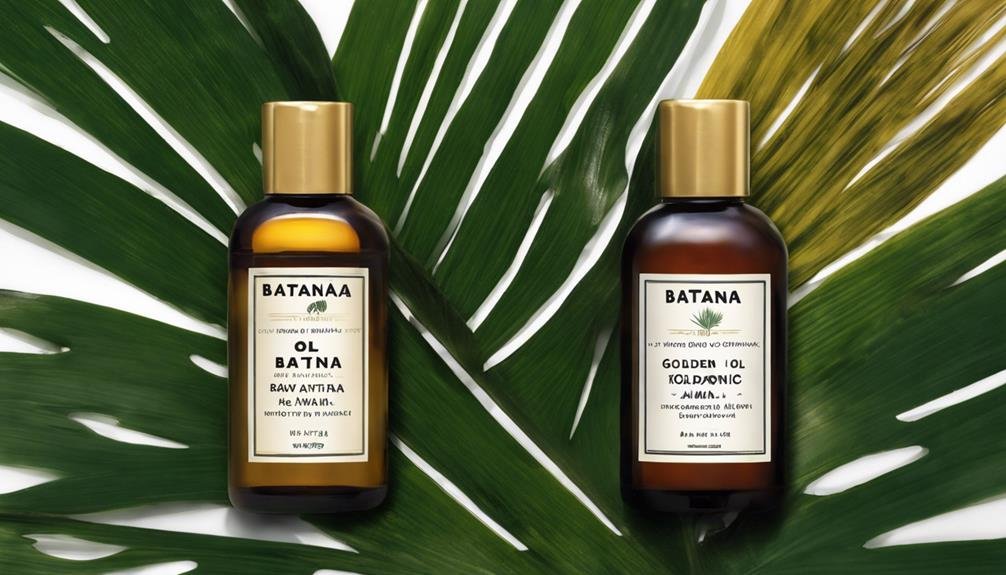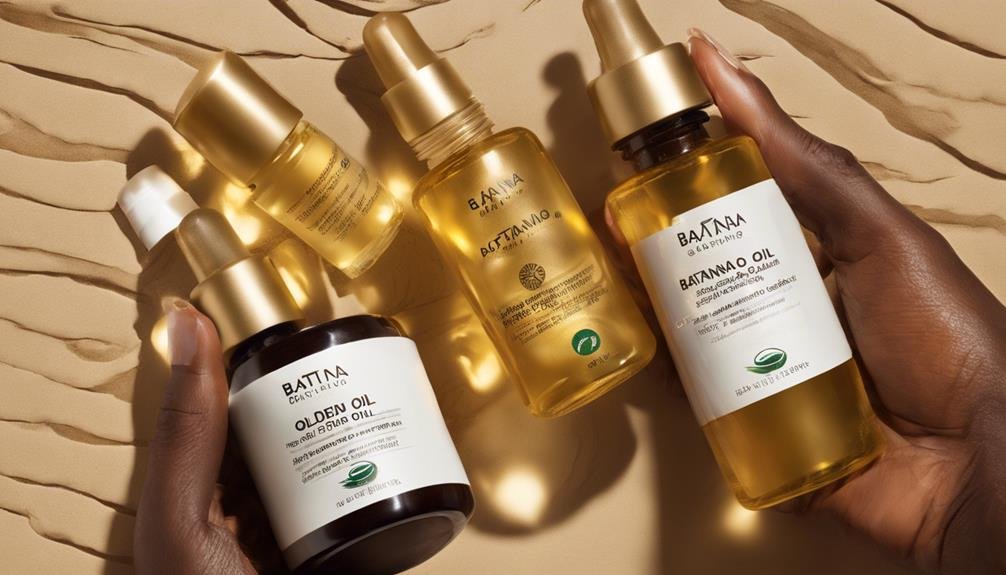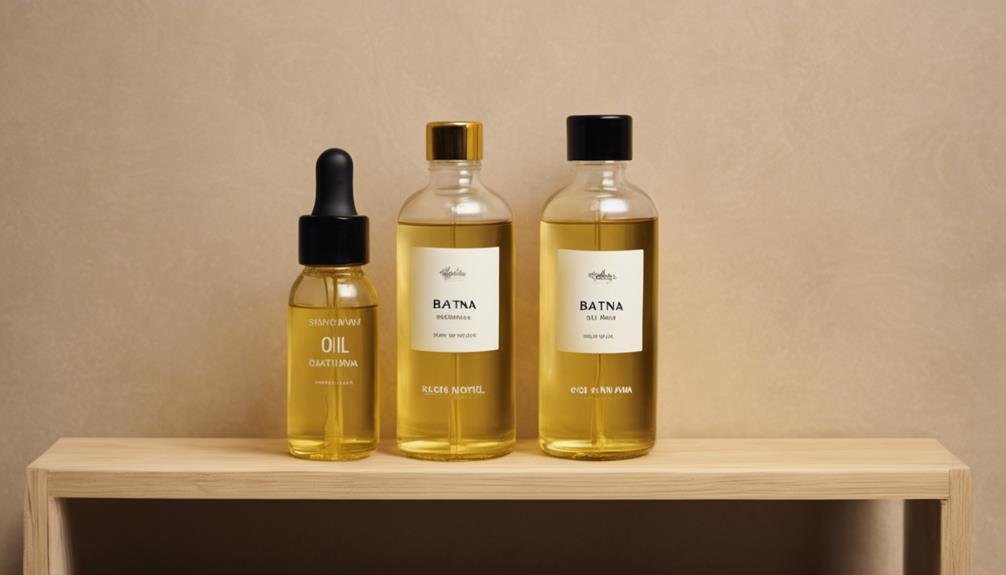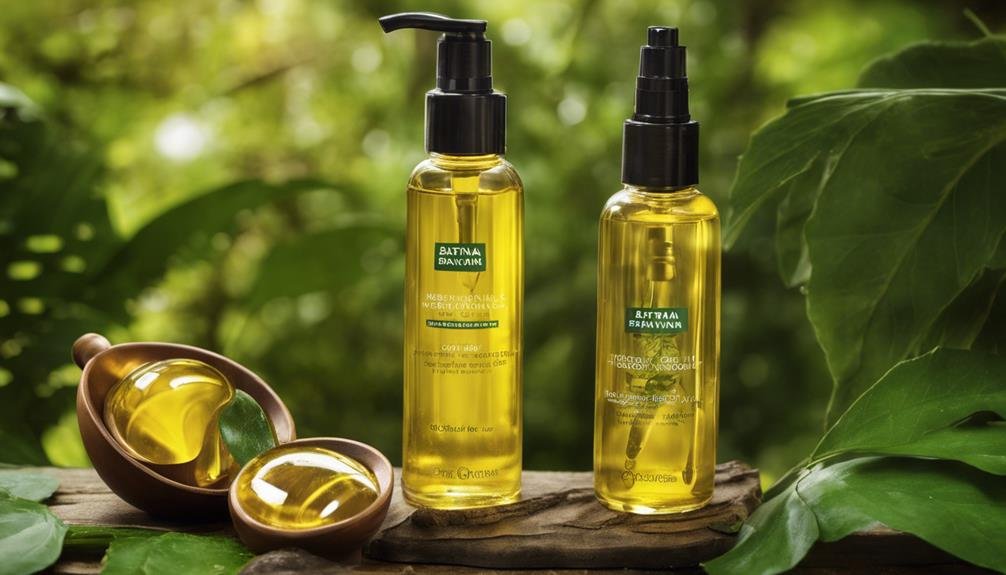You've probably heard about the wonders of batana oil for hair care, but when faced with the choice between organic and raw, you might wonder which is truly better for your locks. Organic batana oil is processed to guarantee purity and consistency, ideal if you're looking for a lightweight option that won't weigh down your hair. On the other hand, raw batana oil is less refined, preserving more natural vitamins and minerals that are essential for nourishing thicker, dryer hair. To make an informed decision, you'll need to weigh these benefits against your personal hair care goals and consider how each type might enhance your routine. What factors should you consider further to select the right type for your hair?
Key Takeaways
- Raw batana oil retains more natural nutrients and vitamins, enhancing moisture and hair growth compared to the often lighter organic oil.
- Organic batana oil is free from synthetic pesticides and fertilizers, making it a safer, purer option for sensitive scalps.
- The thicker consistency of raw batana oil is better suited for coarser or thicker hair types, providing deep moisture and repair.
- Organic batana oil's lighter consistency is more appropriate for fine hair, avoiding excessive oiliness while still offering beneficial properties.
- Price and availability vary, with organic oil typically costing more due to certification and sourcing, but both types offer effective hair benefits.
Understanding Batana Oil
For centuries, the Miskito people of Central and South America have harnessed the enriching properties of batana oil, extracted from the nuts of the American oil palm, Elaeis Oleifera. This remarkable oil, also known as Ojon oil, has become a cornerstone in hair care products due to its potent blend of essential fatty acids, antioxidants, and Vitamin E.
You'll find that batana oil is exceptional for its moisturizing qualities. It deeply nourishes the scalp, fostering an ideal environment for hair growth. The oil's unique fatty acid composition, including oleic, linoleic, and stearic acids, not only improves hair texture and shine but also helps in repairing damage caused by heat, styling, and environmental stressors.
Moreover, its natural richness in antioxidants protects your hair from daily wear and tear, while Vitamin E promotes a healthy scalp. Regular use of batana oil in your hair care routine can transform your hair, making it stronger, healthier, and more resilient.
Extraction: Organic vs. Raw
When choosing between organic and raw batana oil, it's vital to contemplate the extraction methods and their impact on quality and environmental sustainability. Both types retain high levels of essential fatty acids and antioxidants, important for maintaining healthy hair, but their extraction processes differ notably, affecting their purity and overall beneficial properties.
Here's a breakdown of the key differences:
- Environmental Impact: Organic batana oil is extracted from oil palm trees grown without synthetic fertilizers or pesticides. This method is more sustainable and environmentally friendly compared to the extraction of raw batana oil, which may not adhere to these organic farming standards.
- Extraction Methods: Raw batana oil is typically extracted through cold pressing, which preserves its natural properties and nutrients. Organic batana oil can also be cold-pressed, but the practices vary depending on the producer.
- Purity and Safety: The quality of organic batana oil often meets stricter regulatory standards, ensuring that it's free from harmful additives or chemicals. Conversely, the purity of raw batana oil can vary notably based on sourcing and processing.
- Consumer Preference: Increasingly, consumers prefer organic batana oil due to its adherence to health and environmental standards, although responsibly sourced raw batana oil still offers effective hair benefits.
Nutritional Profiles Compared

Delving into the nutritional profiles of raw versus organic batana oil reveals key differences that could influence your choice depending on your hair type and health goals. Let's break down some key nutrients to help you decide.
| Nutrient | Raw Batana Oil | Organic Batana Oil |
|---|---|---|
| Essential Fatty Acids | Extremely high, nourishing | High, but can vary due to processing |
| Antioxidants | Richer content, thanks to minimal processing | Slightly reduced by additional processing |
| Vitamins | Higher levels preserved | Lower levels due to exposure |
| Moisturizing Properties | Intense, ideal for dry or damaged hair | Effective, but less intense |
| Consistency | Denser, suits thick or curly hair | Lighter, better for fine hair |
Raw batana oil's less processed nature means it's packed with antioxidants and essential fatty acids, which are vital for maintaining a healthy scalp and hair. Its dense consistency and robust moisturizing properties make it a standout choice if you're aiming for deep nourishment. On the other hand, if you've got finer hair, the lighter texture of organic batana oil might be just what you need, though it's slightly less potent in nutrients. Choose based on your hair's needs and the specific benefits you're after.
Benefits for Hair Health
Understanding the nutritional differences between raw and organic batana oil sets the stage for exploring how these oils bolster hair health. Both types of batana oil are packed with nutrients that are key to maintaining and enhancing the health of your hair.
Here's what you can expect when you incorporate batana oil into your hair care routine:
- Strength and Elasticity: Batana oil's rich composition helps strengthen your hair strands, reducing breakage and increasing elasticity. This means you'll likely see fewer split ends and less hair snapping off when combing or styling.
- Moisture Retention: Both organic and raw batana oil excel in sealing moisture into your hair fibers. This enhanced moisture retention keeps your hair soft and less prone to becoming brittle and dry, especially in harsh weather conditions.
- Scalp Health: Regular use of batana oil can soothe your scalp, reducing flakes and irritation. A healthy scalp is essential as it supports the roots and fosters an ideal environment for hair growth.
- Hair Growth Promotion: With the presence of vitamin E, batana oil protects your hair from environmental stressors and UV damage, promoting healthier and potentially faster hair growth.
Incorporating batana oil into your hair care regimen supports not just your hair's current condition but also its future health and well-being.
Application Techniques

Mastering the application techniques of batana oil can remarkably amplify its benefits for your hair. Start by focusing on your scalp, where the right massage technique is essential. Apply the oil using circular motions to stimulate blood circulation, enhancing the delivery of nutrients vital for hair health. This method not only preps the scalp but also supports the roots where growth originates.
Consider using batana oil as a pre-shampoo treatment. Apply it to dry hair, thoroughly massaging it into your scalp, and let it sit for 20-60 minutes. This shields your hair from potential damage during shampooing, locking in moisture and nutrients.
If you're dealing with extremely dry or damaged hair, adjust the frequency of use. You might need to apply batana oil up to daily to maintain proper moisture levels and improve hair texture. For regular hair care, applying it 1-2 times a week should suffice.
Don't forget to mix batana oil with your conditioners or hair masks. This can greatly boost their effectiveness, providing your hair with additional nourishment.
For an intensive treatment, leave the oil on overnight, covered with a shower cap or wrap, to allow for deep penetration.
Potential Hair Growth Effects
While batana oil is celebrated for its rich composition of essential fatty acids and antioxidants, there's limited proof that it directly stimulates hair growth. You mightn't see your hairline magically advancing, but you'll likely notice other benefits that improve your hair health overall.
Here's what you can expect:
- Moisture Retention: Batana oil is excellent at locking in moisture. This helps keep your hair flexible and resilient, reducing the likelihood of breakage and split ends. Healthier hair can withstand more styling without showing signs of damage.
- Enhanced Texture and Softness: With regular use, many users find that their hair feels softer and smoother. This can make your hair appear fuller and more vibrant, which might be why some believe it contributes to hair growth.
- Reduced Hair Loss: By preventing dryness and brittleness, batana oil helps minimize hair loss associated with breakage. This isn't regrowth, but it can help your hair look thicker and fuller.
- Overall Hair Health: Incorporating batana oil into your hair care regimen can boost the health of your hair. While it's not a miracle growth solution, healthier hair is more likely to grow well.
Pricing and Availability

When considering Batana Oil, you'll notice that prices can be steep; it's important to compare market rates to guarantee you're getting the best deal.
Due to its natural sourcing from Honduras, the global supply chain affects its availability, but you can conveniently find it online with options for worldwide shipping.
Retail access points vary, so look for reputable suppliers or consider subscription services to potentially cut costs.
Market Price Comparison
You'll find that the cost of batana oil can vary widely, with a standard 4.05 oz bottle of raw batana oil typically priced at around $46.00. When comparing raw to organic batana oil, consider that organic variants, due to certification and sourcing, often cost more.
However, both types are subject to the market's supply and demand dynamics, influencing their availability and pricing.
Here are some points to help you navigate the pricing landscape of batana oil:
- Pricing Variability: Organic batana oil might appear pricier at health-focused retailers due to the rigorous processes involved in certification. Raw batana oil, while slightly cheaper, is often found in specialty online stores.
- Availability: Organic batana oil is generally more accessible in mainstream markets, including large organic product lines, whereas raw batana oil might require a bit of hunting through niche platforms.
- Bulk Options: Consider bulk purchasing if you're a regular user. Both types offer bulk purchase options, which can greatly reduce the cost per ounce.
- Competitive Pricing: Keep an eye out for brands that offer competitive pricing options. Some brands may position their batana oil as a premium product, but there are affordable and high-quality alternatives available.
Global Supply Chains
Understanding the pricing and availability of batana oil requires a closer look at its global supply chains. The journey of batana oil starts mainly in Honduras, where the American oil palm is cultivated. The unique agricultural practices and specific harvest seasons in this region greatly influence both the cost and the consistency of supply.
Since batana oil's value hinges on its purity, the method of processing plays an essential role. You'll find that raw batana oil, celebrated for its 100% natural extraction, commands a higher price compared to its processed counterparts.
The fluctuations in availability aren't uncommon either. During peak times, when demand surges, you might notice that online retailers struggle to keep up, occasionally facing stock shortages. This variability can lead to unexpected delays in shipping, particularly if you're ordering during these high-demand periods.
Moreover, the cost of getting batana oil to your doorstep is affected by international shipping costs and various tariffs on imported goods, depending on where you're located.
Some retailers attempt to mitigate these challenges by offering subscription models, which not only offer price reductions but also guarantee more predictable availability, making it easier for you to manage your batana oil needs.
Retail Access Points
Exploring the retail access points for batana oil reveals a diverse market, with prices typically ranging from $46.00 to $60.00 per bottle due to the costs involved in maintaining organic certification and farming practices.
You'll find that both organic and raw batana oil are accessible through various channels, ensuring you can choose the best option for your hair care routine.
Here's where you can find batana oil:
- Beauty Supply Stores: These stores often stock a variety of organic batana oil products. You might find both raw and organic options, allowing you to compare them directly.
- Organic Health Shops: Dedicated to natural products, these shops are a reliable source for organic batana oil, ensuring you get a product that adheres to strict organic standards.
- Online Marketplaces: Platforms like Amazon and eBay offer a wide range of batana oil products. You can read customer reviews and compare prices easily.
- Subscription Options: Many brands provide subscriptions for batana oil, offering discounts and ensuring you never run out. It's a convenient option if you're a regular user.
Whether you're shopping in beauty supply stores or signing up for convenient online subscription options, you've got access to both organic and raw batana oil at your fingertips.
User Reviews and Feedback
Many users report that raw batana oil enhances hair texture and moisture retention more effectively than its organic counterpart, primarily due to the preservation of its natural properties during the extraction process.
You might find that the rich, earthy scent of raw batana oil is a bit strong, but it's a small price to pay for authenticity and the potent benefits it offers. Despite needing a bit more effort to wash out, the consensus is that the extra rinses are worth it.
You'll also discover that raw batana oil is praised for greatly improving scalp health and reducing hair breakage, especially with consistent use. It's not just about preventing damage; it's about nurturing your scalp and hair to promote overall health.
If you've got thick, curly, or coarse hair, you're in for a treat. The denser consistency of raw batana oil is often highlighted in reviews for its ability to enhance manageability and add a beautiful shine to your locks.
Environmental Impact Considerations

Often, the environmental benefits of choosing raw batana oil are overlooked. Sourced from Honduras, this oil isn't only a boon for your hair but also for Mother Earth.
Let's explore how your choice impacts the environment:
- Supports Agroforestry Systems: When you opt for sustainably sourced batana oil, you're backing agricultural methods that integrate the cultivation of trees and shrubs with crops. This synergy not only enhances biodiversity but also stabilizes the ecosystem.
- Minimizes Energy and Chemical Use: Raw batana oil is cold-pressed, a process that retains more natural nutrients and reduces energy consumption. More importantly, it avoids the environmental pollution typically associated with the high-temperature extraction and chemical solvents used in refining oils.
- Promotes Organic Practices: Choosing batana oil with organic certification guarantees that the product is free from synthetic pesticides and fertilizers. This practice supports healthier soil and greater biodiversity in the farming regions.
- Preserves Traditional Farming: By supporting organic and sustainably sourced batana oil, you're also helping to conserve the traditional farming practices of indigenous communities. These practices have been honed over generations and are integral to maintaining local culture.
Making an informed choice means understanding these impacts and contributing positively to environmental conservation.
Final Recommendations
Let's wrap up with some key pointers to help you choose the right batana oil for your hair needs.
If you're focused on minimizing chemical exposure, organic batana oil is your go-to. It's produced without synthetic fertilizers or pesticides, offering a purer form of hair care.
However, if the nutritional quality is your priority, you might lean towards raw batana oil. It's minimally processed, retaining a rich profile of fatty acids and antioxidants that are essential for hair nourishment and moisture retention.
Raw batana oil, with its thicker consistency, is especially beneficial for those with coarser hair textures. It deeply penetrates to promote scalp and hair health, potentially enhancing hair growth and ensuring healthy hair.
Remember, it's denser, so if you've got finer hair, use it sparingly to avoid a greasy look.
In making your choice, consider your hair type and specific needs. Both types of batana oil contribute positively to healthy hair, but your personal preference for consistency and ingredient purity will guide your final decision.
Here's to finding the perfect batana oil that suits your hair care routine!
Frequently Asked Questions
How to Tell if Batana Oil Is Real or Fake?
To determine if your batana oil is real or fake, start by checking for certifications that prove its purity and ethical sourcing.
Look at the color and texture; genuine oil is usually greenish-brown and creamy. It should smell earthy and smoky.
Confirm the ingredients list only contains batana oil, without additives.
Be wary of low prices, as they often indicate inferior quality.
Always stay informed about fake oil indicators and quality testing methods.
Is Organic Oil Better for Hair?
Yes, organic oil is generally better for your hair.
It tends to be purer, which enhances scalp care and hair health. Sourced from natural environments without harsh chemicals, it retains more nutrients essential for moisture retention.
Using organic oil, you're not only opting for a natural remedy but also ensuring superior ingredient sourcing.
This approach minimizes risks of irritation, promoting healthier, shinier hair through its antioxidant-rich profile.
What Are the Benefits of Raw Batana Oil?
Raw batana oil's nutrient composition makes it ideal for various hair types, providing deep moisturization and repair.
Its application methods are simple, often used directly or in hair masks.
Sourced sustainably, it respects environmental and cultural significance.
This oil not only nourishes your hair but also supports ethical sourcing practices.
Its benefits, including enhancing hair thickness and reducing breakage, underscore its impact on hair health and sustainability.
What Is the Best Oil for Hair Growth Scientifically Proven?
If you're seeking the best oil for hair growth that's scientifically proven, consider Minoxidil.
It's designed to enhance blood flow to your scalp, supporting hair growth phases effectively.
While essential oils like rosemary show potential, their effectiveness isn't as well-documented as Minoxidil.
Remember, oil absorption, scalp health, and even genetic factors play roles in how well these products work.
Consistently applying the right products is vital for the best results.
Conclusion
Ultimately, the choice between organic and raw batana oil depends on your hair type and goals. If you have fine hair, go for the lighter, organic oil. For thicker, more textured hair, the nutrient-rich raw batana oil might be your best bet. Remember, both offer great benefits, so consider what your hair really needs. Check user reviews and think about environmental impacts before making your final choice. Happy oiling, and here's to healthier, more beautiful hair! Don’t forget to consider the specific benefits of batana oil for hair when making your decision. The raw batana oil is known for its deep conditioning and strengthening properties, making it a great choice for those looking to improve overall hair health. On the other hand, organic batana oil is often praised for its ability to nourish and hydrate the hair without weighing it down. By weighing the unique batana oil benefits for hair, you can make a more informed decision about which option will best suit your hair needs.

